- Home
- Salman Rushdie
Midnight's Children Page 31
Midnight's Children Read online
Page 31
We headed north, past Breach Candy Hospital and Mahalaxmi Temple, north along Hornby Vellard past Vallabhbhai Patel Stadium and Haji Ali’s island tomb, north off what had once been (before the dream of the first William Methwold became a reality) the island of Bombay. We were heading towards the anonymous mass of tenements and fishing-villages and textile-plants and film-studios that the city became in these northern zones (not far from here! Not at all far from where I sit within view of local trains!) … an area which was, in those days, utterly unknown to me; I rapidly became disoriented and was then obliged to admit to myself that I was lost. At last, down an unprepossessing side-street full of drainpipe-sleepers and bicycle-repair shops and tattered men and boys, we stopped. Clusters of children assailed my mother as she descended; she, who could never shoo away a fly, handed out small coins, thus enlarging the crowd enormously. Eventually, she struggled away from them and headed down the street; there was a boy pleading, “Gib the car poliss, Begum? Number one A-class poliss, Begum? I watch car until you come, Begum? I very fine watchman, ask anyone!” … In some panic, I listened in for her reply. How could I get out of this boot under the eyes of a guardian-urchin? There was the embarrassment of it; and besides, my emergence would have created a sensation in the street … my mother said, “No.” She was disappearing down the street; the would-be polisher and watchman gave up eventually; there was a moment when all eyes turned to watch the passing of a second car, just in case it, too, stopped to disgorge a lady who gave away coins as if they were nuts; and in that instant (I had been looking through several pairs of eyes to help me choose my moment) I performed my trick with the pink plastic and was out in the street beside a closed car-boot in a flash. Setting my lips grimly, and ignoring all outstretched palms, I set off in the direction my mother had taken, a pocket-sized sleuth with the nose of a bloodhound and a loud drum pounding in the place where my heart should have been … and arrived, a few minutes later, at the Pioneer Café.
Dirty glass in the window; dirty glasses on the tables—the Pioneer Café was not much when compared to the Gaylords and Kwalitys of the city’s more glamorous parts; a real rutputty joint, with painted boards proclaiming LOVELY LASSI and FUNTABULOUS FALOODA and BHEL-PURIBOMBAY FASHION, with filmi playback music blaring out from a cheap radio by the cash-till, a long narrow greeny room lit by flickering neon, a forbidding world in which broken-toothed men sat at reccine-covered tables with crumpled cards and expressionless eyes. But for all its grimy decrepitude, the Pioneer Café was a repository of many dreams. Early each morning, it would be full of the best-looking ne’er-do-wells in the city, all the goondas and taxi-drivers and petty smugglers and racecourse tipsters who had once, long ago, arrived in the city dreaming of film stardom, of grotesquely vulgar homes and black money payments; because every morning at six, the major studios would send minor functionaries to the Pioneer Café to rope in extras for the day’s shooting. For half an hour each morning, when D. W. Rama Studios and Filmistan Talkies and R K Films were taking their pick, the Pioneer was the focus of all the city’s ambitions and hopes; then the studio scouts left, accompanied by the day’s lucky ones, and the Café emptied into its habitual, neon-lit torpor. Around lunchtime, a different set of dreams walked into the Café, to spend the afternoon hunched over cards and Lovely Lassi and rough biris—different men with different hopes: I didn’t know it then, but the afternoon Pioneer was a notorious Communist Party hangout.
It was afternoon; I saw my mother enter the Pioneer Café; not daring to follow her, I stayed in the street, pressing my nose against a spider-webbed corner of the grubby window-pane; ignoring the curious glances I got—because my whites, although boot-stained, were nevertheless starched; my hair, although boot-rumpled, was well-oiled; my shoes, scuffed as they were, were still the plimsolls of a prosperous child—I followed her with my eyes as she went hesitantly and verruca-hobbled past rickety tables and hard-eyed men; I saw my mother sit down at a shadowed table at the far end of the narrow cavern; and then I saw the man who rose to greet her.
The skin on his face hung in folds which revealed that he had once been overweight; his teeth were stained with paan. He wore a clean white kurta with Lucknow-work around the buttonholes. He had long hair, poetically long, hanging lankly over his ears; but the top of his head was bald and shiny. Forbidden syllables echoed in my ears: Na. Dir. Nadir. I realized that I wished desperately that I’d never resolved to come.
Once upon a time there was an underground husband who fled, leaving loving messages of divorce; a poet whose verses didn’t even rhyme, whose life was saved by pie-dogs. After a lost decade he emerged from goodness-knows-where, his skin hanging loose in memory of his erstwhile plumpness; and, like his once-upon-a-time wife, he had acquired a new name … Nadir Khan was now Qasim Khan, official candidate of the official Communist Party of India. Lai Qasim. Qasim the Red. Nothing is without meaning: not without reason are blushes red. My uncle Hanif said, “Watch out for the Communists!” and my mother turned scarlet; politics and emotions were united in her cheeks … through the dirty, square, glassy cinema-screen of the Pioneer Café’s window, I watched Amina Sinai and the no-longer-Nadir play out their love scene; they performed with the ineptitude of genuine amateurs.
On the reccine-topped table, a packet of cigarettes: State Express 555. Numbers, too, have significance: 420, the name given to frauds; 1001, the number of night, of magic, of alternative realities—a number beloved of poets and detested by politicians, for whom all alternative versions of the world are threats; and 555, which for years I believed to be the most sinister of numbers, the cipher of the Devil, the Great Beast, Shaitan himself. (Cyrus-the-great told me so, and I didn’t contemplate the possibility of his being wrong. But he was: the true demonic number is not 555, but 666: yet, in my mind, a dark aura hangs around the three fives to this day.) … But I am getting carried away. Suffice to say that Nadir-Qasim’s preferred brand was the aforesaid State Express; that the figure five was repeated three times on the packet; and that its manufacturers were W.D. & H.O. Wills. Unable to look into my mother’s face, I concentrated on the cigarette-packet, cutting from two-shot of lovers to this extreme close-up of nicotine.
But now hands enter the frame—first the hands of Nadir-Qasim, their poetic softness somewhat callused these days; hands flickering like candle-flames, creeping forward across reccine, then jerking back; next a woman’s hands, black as jet, inching forwards like elegant spiders; hands lifting up, off reccine tabletop, hands hovering above three fives, beginning the strangest of dances, rising, falling, circling one another, weaving in and out between each other, hands longing for touch, hands outstretching tensing quivering demanding to be—but always at last jerking back, fingertips avoiding fingertips, because what I’m watching here on my dirty glass cinema-screen is, after all, an Indian movie, in which physical contact is forbidden lest it corrupt the watching flower of Indian youth; and there are feet beneath the table and faces above it, feet advancing towards feet, faces tumbling softly towards faces, but jerking away all of a sudden in a cruel censor’s cut … two strangers, each bearing a screen-name which is not the name of their birth, act out their half-unwanted roles. I left the movie before the end, to slip back into the boot of the unpolished unwatched Rover, wishing I hadn’t gone to see it, unable to resist wanting to watch it all over again.
What I saw at the very end: my mother’s hands raising a half-empty glass of Lovely Lassi; my mother’s lips pressing gently, nostalgically against the mottled glass; my mother’s hands handing the glass to her Nadir-Qasim; who also applied, to the opposite side of the glass, his own, poetic mouth. So it was that life imitated bad art, and my uncle Hanif’s sister brought the eroticism of the indirect kiss into the green neon dinginess of the Pioneer Café.
To sum up: in the high summer of 1957, at the peak of an election campaign, Amina Sinai blushed inexplicably at a chance mention of the Communist Party of India. Her son—in whose turbulent thoughts there was still room for
one more obsession, because a ten-year-old brain can accommodate any number of fixations—followed her into the north of the city, and spied on a pain-filled scene of impotent love. (Now that Ahmed Sinai was frozen up, Nadir-Qasim didn’t even have a sexual disadvantage; torn between a husband who locked himself in an office and cursed mongrels, and an ex-husband who had once, lovingly, played games of hit-the-spittoon, Amina Sinai was reduced to glass-kissery and hand-dances.)
Questions: did I ever, after that time, employ the services of pink plastic? Did I return to the café of extras and Marxists? Did I confront my mother with the heinous nature of her offence—because what mother has any business to—never mind about what once-upon-a-time—in full view of her only son, how could she how could she how could she? Answers: I did not; I did not; I did not.
What I did: when she went on “shopping trips,” I lodged myself in her thoughts. No longer anxious to gain the evidence of my own eyes, I rode in my mother’s head, up to the north of the city; in this unlikely incognito, I sat in the Pioneer Café and heard conversations about the electoral prospects of Qasim the Red; disembodied but wholly present, I trailed my mother as she accompanied Qasim on his rounds, up and down the tenements of the district (were they the same chawls which my father had recently sold, abandoning his tenants to their fate?), as she helped him to get water-taps fixed and pestered landlords to initiate repairs and disinfections. Amina Sinai moved amongst the destitute on behalf of the Communist Party—a fact which never failed to leave her amazed. Perhaps she did it because of the growing impoverishment of her own life; but at the age of ten I wasn’t disposed to be sympathetic; and in my own way, I began to dream dreams of revenge.
The legendary Caliph, Haroun al-Rashid, is said to have enjoyed moving incognito amongst the people of Baghdad; I, Saleem Sinai, have also travelled in secret through the byways of my city, but I can’t say I had much fun.
Matter of fact descriptions of the outré and bizarre, and their reverse, namely heightened, stylized versions of the everyday—these techniques, which are also attitudes of mind, I have lifted—or perhaps absorbed—from the most formidable of the midnight children, my rival, my fellow-changeling, the supposed son of Wee Willie Winkie: Shiva-of-the-knees. They were techniques which, in his case, were applied entirely without conscious thought, and their effect was to create a picture of the world of startling uniformity, in which one could mention casually, in passing as it were, the dreadful murders of prostitutes which began to fill the gutter-press in those days (while the bodies filled the gutters), while lingering passionately on the intricate details of a particular hand of cards. Death, and defeat at rummy were all of a piece to Shiva; hence his terrifying, nonchalant violence, which in the end … but to begin with beginnings:
Although, admittedly, it’s my own fault, I’m bound to say that if you think of me purely as a radio, you’ll only be grasping half the truth. Thought is as often pictorial or purely emblematic as verbal; and anyway, in order to communicate with, and understand, my colleagues in the Midnight Children’s Conference, it was necessary for me quickly to advance beyond the verbal stage. Arriving in their infinitely various minds, I was obliged to get beneath the surface veneer of front-of-mind thoughts in incomprehensible tongues, with the obvious (and previously demonstrated) effect that they became aware of my presence. Remembering the dramatic effect such an awareness had had on Evie Burns, I went to some pains to alleviate the shock of my entry. In all cases, my standard first transmission was an image of my face, smiling in what I trusted was a soothing, friendly, confident and leader-like fashion, and of a hand stretched out in friendship. There were, however, teething troubles.
It took me a little while to realize that my picture of myself was heavily distorted by my own self-consciousness about my appearance; so that the portrait I sent across the thought-waves of the nation, grinning like a Cheshire cat, was about as hideous as a portrait could be, featuring a wondrously enlarged nose, a completely non-existent chin and giant stains on each temple. It’s no wonder that I was often greeted by yelps of mental alarm. I, too, was often similarly frightened by the self-images of my ten-year-old fellows. When we discovered what was happening, I encouraged the membership of the Conference, one by one, to go and look into a mirror, or a patch of still water; and then we did manage to find out what we really looked like. The only problems were that our Keralan member (who could, you remember, travel through mirrors) accidentally ended up emerging through a restaurant mirror in the smarter part of New Delhi, and had to make a hurried retreat; while the blue-eyed member for Kashmir fell into a lake and accidentally changed sex, entering as a girl and emerging as a beautiful boy.
When I first introduced myself to Shiva, I saw in his mind the terrifying image of a short, rat-faced youth with filed-down teeth and two of the biggest knees the world has ever seen.
Faced with a picture of such grotesque proportions, I allowed the smile on my own beaming image to wither a little; my outstretched hand began to falter and twitch. And Shiva, feeling my presence, reacted at first with utter rage; great boiling waves of anger scalded the inside of my head; but then, “Hey—look—I know you! You’re the rich kid from Methwold’s Estate, isn’t it?” And I, equally astonished, “Winkie’s son—the one who blinded Eyeslice!” His self-image puffed up with pride. “Yah, yaar, that’s me. Nobody messes with me, man!” Recognition reduced me to banalities: “So! How’s your father, anyway? He doesn’t come round …” And he, with what felt very like relief: “Him, man? My father’s dead.”
A momentary pause; then puzzlement—no anger now—and Shiva, “Lissen, yaar, this is damn good—how you doin’ it?” I launched into my standard explanation, but after a few instants he interrupted, “So! Lissen, my father said I got born at exactly midnight also—so don’t you see, that makes us joint bosses of this gang of yours! Midnight is best, agreed? So—those other kids gotta do like we tell them!” There rose before my eyes the image of a second, and more potent, Evelyn Lilith Burns … dismissing this unkind notion, I explained, “That wasn’t exactly my idea for the Conference; I had in mind something more like a, you know, sort of loose federation of equals, all points of view given free expression …” Something resembling a violent snort echoed around the walls of my head. “That, man, that’s only rubbish. What we ever goin’ to do with a gang like that? Gangs gotta have gang bosses. You take me—” (the puff of pride again) “I been running a gang up here in Matunga for two years now. Since I was eight. Older kids and all. What d’you think of that?” And I, without meaning to, “What’s it do, your gang—does it have rules and all?” Shiva laughter in my ears … “Yah, little rich boy: one rule. Everybody does what I say or I squeeze the shit outa them with my knees!” Desperately, I continued to try and win Shiva round to my point of view: “The thing is, we must be here for a purpose, don’t you think? I mean, there has to be a reason, you must agree? So what I thought, we should try and work out what it is, and then, you know, sort of dedicate our lives to …” “Rich kid,” Shiva yelled, “you don’t know one damn thing! What purpose, man? What thing in the whole sister-sleeping world got reason, yara? For what reason you’re rich and I’m poor? Where’s the reason in starving, man? God knows how many millions of damn fools living in this country, man, and you think there’s a purpose! Man, I’ll tell you—you got to get what you can, do what you can with it, and then you got to die. That’s reason, rich boy. Everything else is only mother-sleeping wind!”
And now I, in my midnight bed, begin to shake … “But history,” I say, “and the Prime Minister wrote me a letter … and don’t you even believe in … who knows what we might …” He, my alter ego, Shiva, butted in: “Lissen, little boy—you’re so fall of crazy stuff, I can see I’m going to have to take this thing over. You tell that to all these other freak kids!”
Nose and knees and knees and nose … the rivalry that began that night would never be ended, until two knives slashed, downdowndown … whether the spirits of Mian Ab
dullah, whom knives killed years before, had leaked into me, imbuing me with the notion of loose federalism and making me vulnerable to knives, I cannot say; but at that point I found a measure of courage and told Shiva, “You can’t run the Conference; without me, they won’t even be able to listen to you!”
And he, confirming the declaration of war: “Rich kid, they’ll want to know about me; you just try and stop me!”
“Yes,” I told him, “I’ll try.”
Shiva, the god of destruction, who is also most potent of deities; Shiva, greatest of dancers; who rides on a bull; whom no force can resist … the boy Shiva, he told us, had to fight for survival from his earliest days. And when his father had, about a year previously, completely lost his singing voice, Shiva had had to defend himself against Wee Willie Winkie’s parental zeal. “He blindfolded me, man! He wrapped a rag around my eyes an’ took me to the roof of the chawl, man! You know what was in his hand? A sister-sleeping hammer, man! A hammer! Bastard was going to smash my legs up, man—it happens, you know, rich boy, they do it to kids so they can always earn money begging—you get more if you’re all broken up, man! So I’m pushed over till I’m lying down on the roof, man; and then—” And then hammer swinging down towards knees larger and knobblier than any policeman’s, an easy target, but now the knees went into action, faster than lightning the knees parted—felt the breath of the downrushing hammer and spread wide apart; and then hammer plunging between knees, still held in his father’s hand; and then, the knees rushing together like fists. The hammer, clattering harmlessly on concrete. The wrist of Wee Willie Winkie, clamped between the knees of his blindfolded son. Hoarse breaths escaping from the lips of the anguished father. And still the knees, closing ininin, tighter and tighter, until there is a snap. “Broke his goddamn wrist, man! That showed him—damn fine, no? I swear!”

 Shame
Shame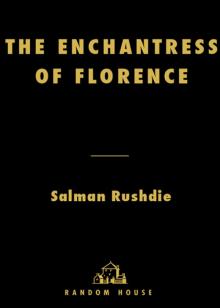 The Enchantress of Florence
The Enchantress of Florence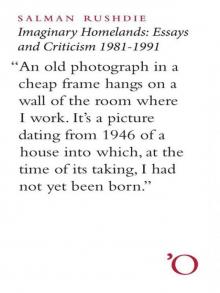 Imaginary Homelands: Essays and Criticism 1981-1991
Imaginary Homelands: Essays and Criticism 1981-1991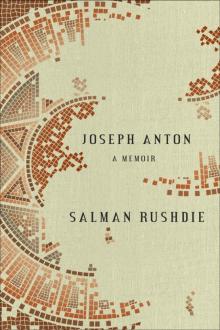 Joseph Anton: A Memoir
Joseph Anton: A Memoir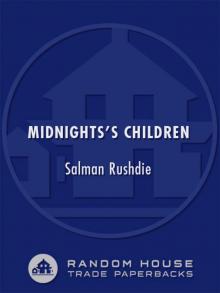 Midnight's Children
Midnight's Children East, West: Stories
East, West: Stories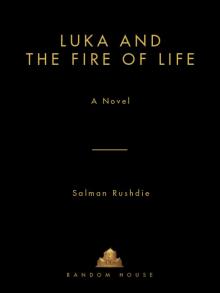 Luka and the Fire of Life
Luka and the Fire of Life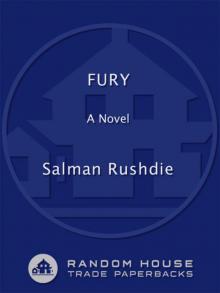 Fury Fury Fury
Fury Fury Fury Haroun and the Sea of Stories
Haroun and the Sea of Stories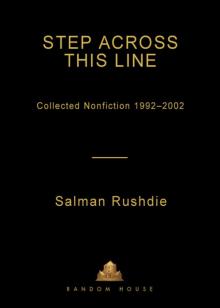 Step Across This Line: Collected Nonfiction 1992-2002
Step Across This Line: Collected Nonfiction 1992-2002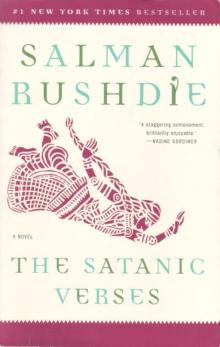 The Satanic Verses
The Satanic Verses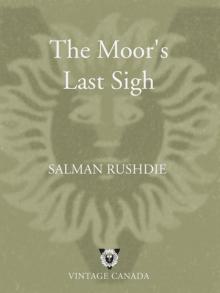 The Moor's Last Sigh
The Moor's Last Sigh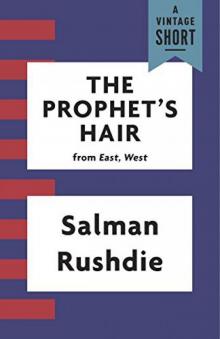 The Prophet's Hair
The Prophet's Hair The Ground Beneath Her Feet
The Ground Beneath Her Feet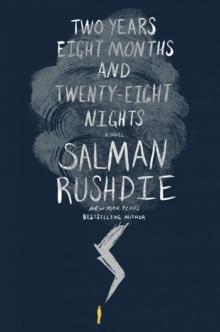 Two Years Eight Months and Twenty-Eight Nights
Two Years Eight Months and Twenty-Eight Nights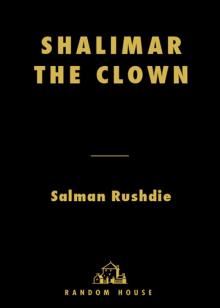 Shalimar the Clown
Shalimar the Clown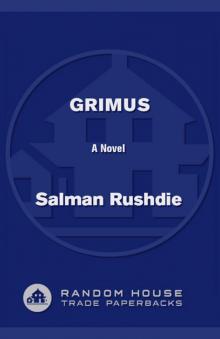 Grimus
Grimus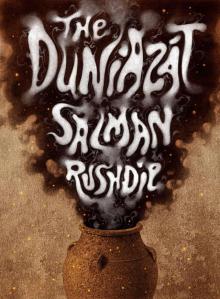 The Duniazát
The Duniazát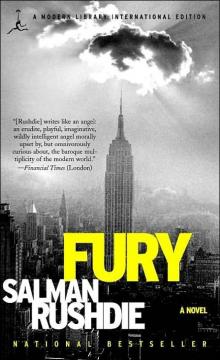 Fury
Fury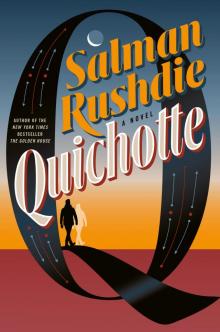 Quichotte
Quichotte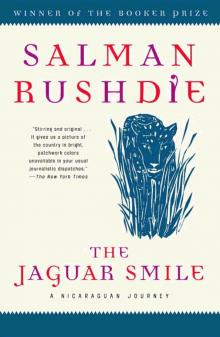 The Jaguar Smile
The Jaguar Smile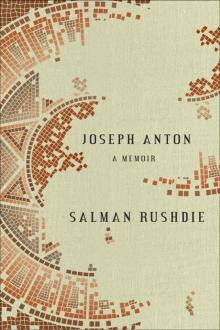 Joseph Anton
Joseph Anton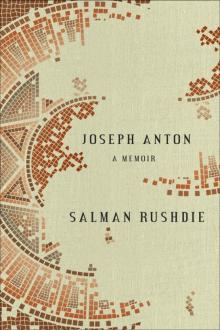 Joseph Anton: A Memoir: A Memoir
Joseph Anton: A Memoir: A Memoir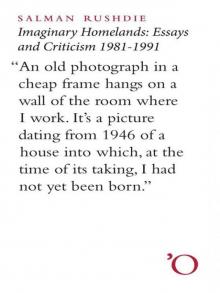 Imaginary Homelands
Imaginary Homelands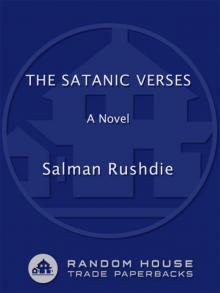 The Satanic Verses: A Novel
The Satanic Verses: A Novel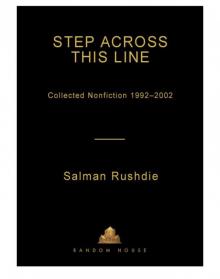 Step Across This Line
Step Across This Line East, West
East, West